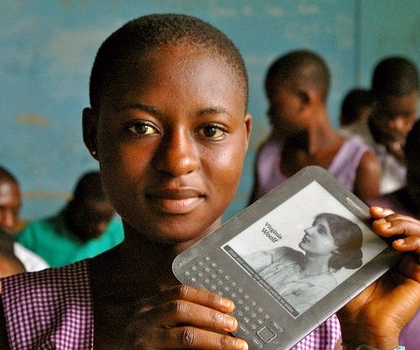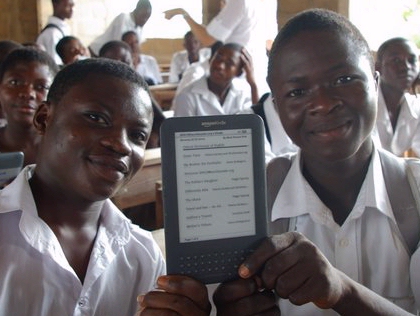
in 2008, a man took his family on a tour of the world. While visiting an orphanage in South America, he asked what was behind the padlocked doors of a tin building. The answer was disturbing: it was books. In fact, it was the local library. The materials had become outdated, and the library fell into disuse.
And then he had an idea. Throughout the trip his own daughters had been reading ebooks on their digital reader. He got the idea of starting a charity with one simple goal: to use ebook technology to “put a library of books within reach of every family on the planet”. He named it World Reader.org — and today on Facebook, Amazon posted pictures of their successful mission in Africa.
Someday the group hopes to reach out to the entire world, but they’re starting in Africa where they feel they can have the most impact.
If someone asks you to go hand out 440 e-readers, you might think that after, say 100, it could start to feel mundane. On the contrary, every single time we handed a student an e-reader, it was as if we were handing someone raw power…
The 440 Kindles were filled with books of local interest and literary classics, and the workers seem to be filled with new hope. They’d seen how cellphones overcame the need for land lines in the developing world, according to their web page, and now firmly believe that digital readers “will become the easiest, least expensive, and most reliable way to deliver books to under-served areas and under-privileged peoples.” They chose Amazon’s Kindle as the best device for their project (partly because it has global connectivity to a wireless network). And now even children in a remote village in Africa can join in that big global conversation which passes from generation to generation.
Meanwhile, in Seattle, Amazon posted an announcement about it on their Facebook page, and in Georgia, one of the first people to see it posted a response. “Maybe a silly question, but I’m going to ask it anyway — do they have electricity so they can charge them?” But on the internet, the charity workers are already offering up answers on their web page about Africa. “Mobile phones have helped pave the way for electricity even in remote locations, and, happily, e-readers consume relatively little power…”
And where there wasn’t electricity — for example, in a pilot program in Ghana — they’d partner with other organizations to install a solar cell, plus a satellite for internet access. Back on Facebook, another woman in Rhode Island added, “Hope they don’t make it to the black market.” But theft hasn’t been a problem, the web page explains. And the optimism continues.
I love the way that distance starts becoming irrelevant thanks to some simple, everyday technology. The group is thrilled that they can eliminate the cost of shipping these books — and that ebooks are often cheaper than printed books. And back in America, nearly a thousand people clicked Facebook’s “like” icon for the news of their mission, while another 140 left supportive comments.

You have a great looking website here. I’m looking to duplicate what you’ve done here. Any advice?